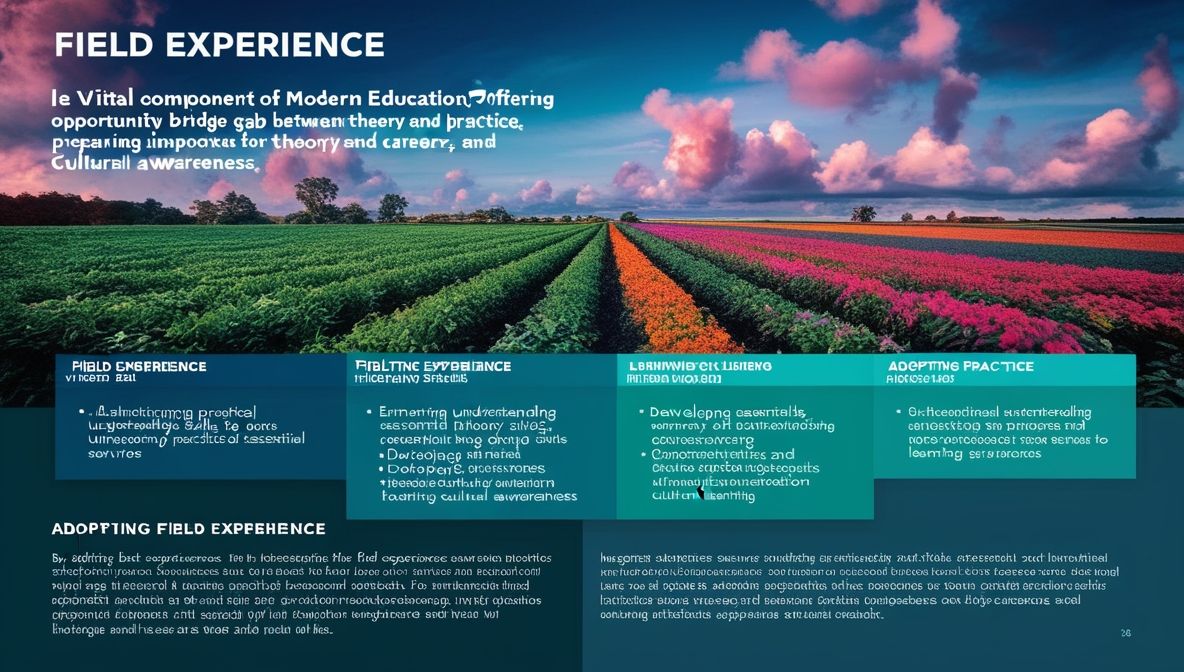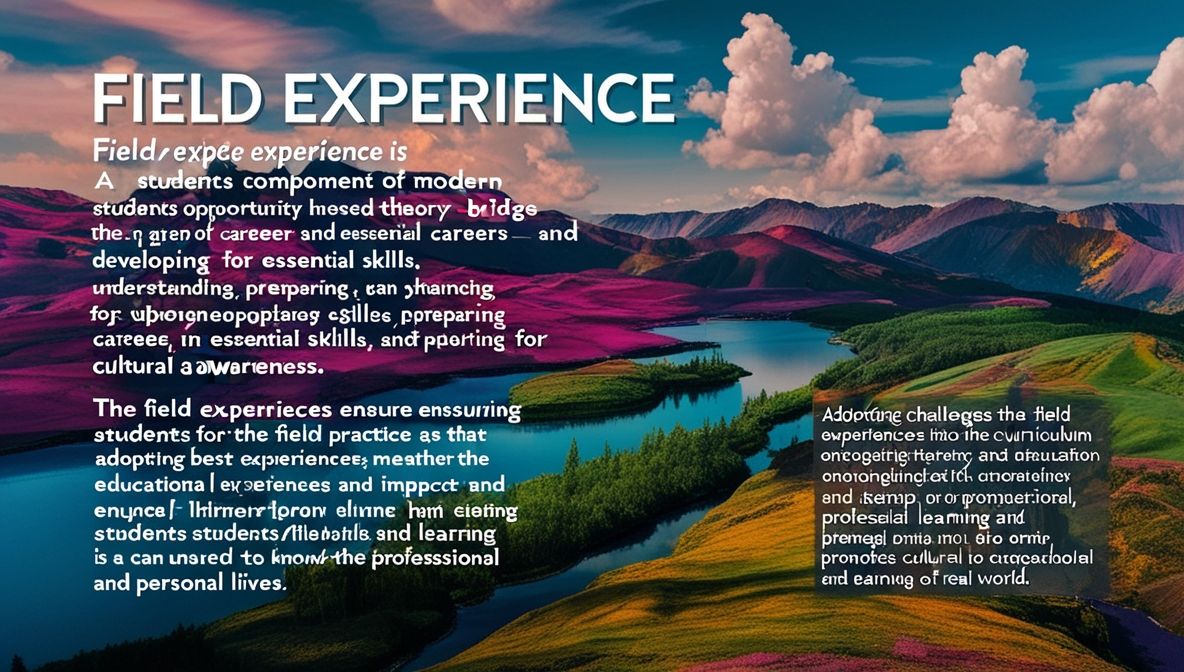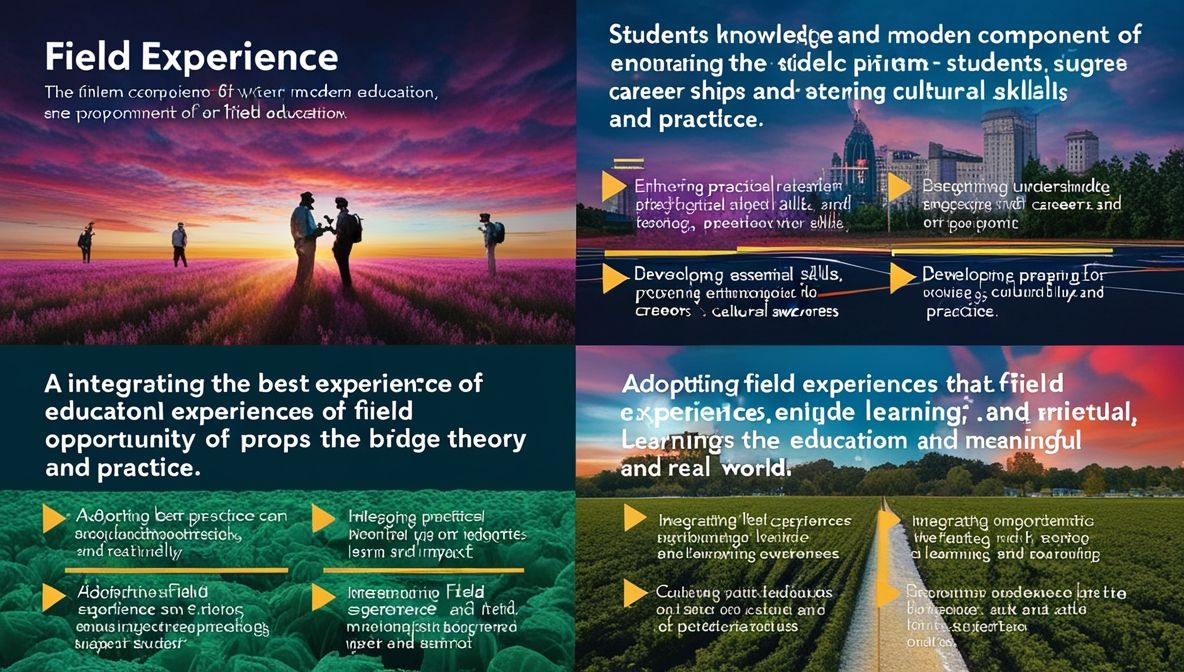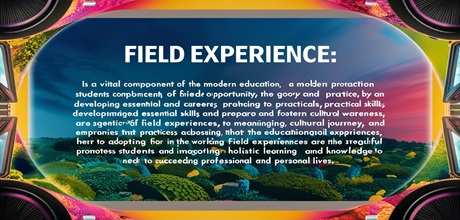Introduction
The Role of Field Experience in Learning plays a crucial role in the educational journey of students, offering them an opportunity to apply theoretical knowledge in real-world settings. This experiential learning approach not only enhances understanding and retention of subject matter but also develops essential skills that are difficult to acquire in a traditional classroom environment. This article explores the various dimensions of field experience in learning, including its benefits, challenges, and best practices for integration into educational curricula.

The Importance of Field Experience
- Enhancing Practical Understanding: Field experience allows students to see the practical applications of theoretical concepts. For example, a biology student studying ecosystems can gain a deeper understanding by observing flora and fauna in their natural habitats. This hands-on approach makes learning more engaging and meaningful, as students can directly observe the relevance of their studies.
- Skill Development: Field experiences help in the development of various skills that are essential for professional success. These include critical thinking, problem-solving, communication, and teamwork. For instance, a student teacher gains classroom management skills and teaching techniques that can only be learned through actual practice with students.
- Career Preparation: Engaging in field experiences provides students with a glimpse into their future careers. This exposure is invaluable in helping them make informed decisions about their professional paths. Internships, practicums, and cooperative education programs enable students to explore different fields, understand workplace dynamics, and build professional networks.
- Cultural and Social Awareness: Field experiences often involve interaction with diverse communities and environments. This exposure fosters cultural competence and social awareness, as students learn to appreciate different perspectives and adapt to various social contexts. For example, social work students participating in community outreach programs develop empathy and understanding of social issues affecting different populations.
- Increased Motivation and Engagement: Experiential learning can significantly boost student motivation and engagement. When students see the direct impact of their work, they are more likely to be enthusiastic and committed to their studies. Field experiences provide a break from traditional classroom settings, offering a refreshing and stimulating learning environment.

Types of Field Experiences
- Internships: Internships are structured programs where students work in professional settings related to their field of study. These experiences allow students to apply classroom knowledge, gain practical skills, and build professional connections. Internships can be part-time or full-time and are often completed during summer breaks or as part of a co-op program.
- Practicums: Practicums are supervised practical applications of previously studied theory. Common in fields such as education, nursing, and social work, practicums involve direct hands-on work under the guidance of experienced professionals. This mentorship helps students refine their skills and receive constructive feedback.
- Field Trips: Field trips are shorter, typically one-day excursions designed to provide students with direct exposure to a particular subject or environment. These trips can range from visits to historical sites and museums to nature reserves and industrial facilities. Field trips offer a valuable opportunity for experiential learning and help contextualize classroom lessons.
- Service Learning: Service learning integrates community service with academic learning objectives. Students engage in projects that address community needs while reflecting on their experiences in relation to their coursework. This approach not only enhances academic learning but also promotes civic responsibility and social justice.
- Study Abroad Programs: Study abroad programs provide students with the chance to live and study in a foreign country. These programs offer a unique cultural immersion experience, allowing students to develop global awareness, language skills, and intercultural competence. Study abroad experiences can be short-term or long-term, depending on the program.
Challenges of Field Experience
While field experiences offer numerous benefits, they also present certain challenges that need to be addressed to ensure their effectiveness.
- Logistical Issues: Organizing field experiences can be logistically complex, involving coordination between educational institutions, host organizations, and students. Transportation, scheduling, and accommodation arrangements require careful planning and resources.
- Cost and Accessibility: Field experiences can be costly, posing a barrier for some students. Expenses related to travel, accommodation, and program fees may limit participation, particularly for students from low-income backgrounds. Ensuring equitable access to field experiences is a critical consideration.
- Safety Concerns: Ensuring the safety and well-being of students during field experiences is paramount. Risk assessments, health and safety protocols, and emergency preparedness plans must be in place to protect students in diverse environments.
- Assessment and Evaluation: Assessing the learning outcomes of field experiences can be challenging. Traditional evaluation methods may not fully capture the experiential learning process. Developing robust assessment tools that measure both the acquisition of practical skills and the application of theoretical knowledge is essential.

Best Practices for Integrating Field Experience
To maximize the benefits of field experiences, educational institutions should adopt best practices that address the challenges and enhance the learning outcomes.
- Structured Programs: Design field experience programs with clear objectives, expectations, and outcomes. Structured programs ensure that students have a meaningful and focused learning experience. Providing detailed guidelines, orientation sessions, and support resources can help students prepare effectively.
- Partnerships and Collaboration: Establishing strong partnerships with host organizations, community groups, and industry partners is crucial. Collaborative relationships ensure that field experiences are relevant, well-organized, and mutually beneficial. Regular communication and feedback between all stakeholders enhance the quality of the programs.
- Inclusive Access: Develop strategies to make field experiences accessible to all students, regardless of their financial background. Scholarships, grants, and subsidized programs can help reduce financial barriers. Additionally, offering a variety of field experience options, including local opportunities, ensures that all students can participate.
- Integration with Curriculum: Ensure that field experiences are integrated into the academic curriculum and align with learning objectives. This integration helps students make connections between theory and practice and reinforces the relevance of their coursework. Pre- and post-field experience activities, such as reflective journals and discussion sessions, can enhance learning.
- Support and Mentorship: Provide adequate support and mentorship for students during their field experiences. Faculty advisors, field supervisors, and mentors play a crucial role in guiding students, offering feedback, and addressing challenges. Regular check-ins and debriefing sessions help students reflect on their experiences and gain insights.
Conclusion
Field experience is a vital component of modern education, offering students the opportunity to bridge the gap between theory and practice. By enhancing practical understanding, developing essential skills, preparing for careers, and fostering cultural awareness, field experiences enrich the educational journey and prepare students for the complexities of the real world. Despite the challenges, adopting best practices can ensure that field experiences are accessible, meaningful, and impactful. Ultimately, integrating field experience into the curriculum promotes holistic learning and equips students with the knowledge and skills needed to succeed in their professional and personal lives.

ovwxxt
t7bhvw
vnk6k8
3fbsy2
q3p6jp
qdxcqq
Thank you, I have recently been searching for info about this subject for ages and yours is the best I have found out so far. However, what in regards to the conclusion? Are you sure about the supply?
1ihagt
i22z04
Wake up your way with this premium CD player alarm clock radio. Whether you prefer to rise with the AM/FM radio, your favorite CD, or a standard buzzer, this versatile alarm clock with CD player has you covered. Its intuitive design includes dual alarms, a large digital display, snooze/sleep timers, and USB charging for your phone. Enjoy high-quality stereo sound from a compact unit that fits easily on any bedside table or shelf. The best clock radios with CD player combine retro functionality with modern convenience—and this one leads the pack.
Fantastic beat ! I wish to apprentice while you amend your site, how could i subscribe for a blog web site? The account helped me a acceptable deal. I had been tiny bit acquainted of this your broadcast provided bright clear idea
Wow, amazing blog layout! How long have you been blogging for? you make blogging look easy. The overall look of your web site is fantastic, let alone the content!
Have you ever thought about including a little bit more than just your articles? I mean, what you say is valuable and everything. Nevertheless think of if you added some great photos or video clips to give your posts more, “pop”! Your content is excellent but with images and clips, this blog could certainly be one of the very best in its field. Terrific blog!
I am glad for commenting to make you understand what a magnificent discovery my child experienced browsing your site. She realized so many details, not to mention what it’s like to possess a very effective helping spirit to get many people smoothly grasp various extremely tough things. You undoubtedly surpassed our desires. Thanks for supplying those invaluable, safe, explanatory and also easy tips on that topic to Kate.
Hello.This post was really fascinating, particularly since I was looking for thoughts on this subject last Wednesday.
This website is my inspiration , very superb style and perfect articles.
Regards for helping out, wonderful info. “If at first you don’t succeed, find out if the loser gets anything.” by Bill Lyon.
F*ckin’ remarkable things here. I am very glad to see your post. Thanks a lot and i am looking forward to contact you. Will you kindly drop me a mail?
After study a few of the blog posts on your website now, and I truly like your way of blogging. I bookmarked it to my bookmark website list and will be checking back soon. Pls check out my web site as well and let me know what you think.
It?¦s in point of fact a nice and useful piece of information. I?¦m glad that you simply shared this useful information with us. Please stay us up to date like this. Thanks for sharing.
Hiya very nice web site!! Man .. Excellent .. Wonderful .. I will bookmark your web site and take the feeds additionally?KI am happy to search out a lot of helpful information here within the submit, we’d like develop more techniques on this regard, thanks for sharing. . . . . .
Hi, Neat post. There is a problem with your site in internet explorer, would test this… IE still is the market leader and a good portion of people will miss your fantastic writing due to this problem.
Hmm it looks like your website ate my first comment (it was extremely long) so I guess I’ll just sum it up what I wrote and say, I’m thoroughly enjoying your blog. I too am an aspiring blog writer but I’m still new to everything. Do you have any recommendations for rookie blog writers? I’d really appreciate it.
Awesome blog! Is your theme custom made or did you download it from somewhere? A theme like yours with a few simple tweeks would really make my blog jump out. Please let me know where you got your theme. Many thanks
Hello, Neat post. There’s a problem together with your web site in web explorer, could check this?K IE still is the market chief and a huge part of folks will omit your great writing because of this problem.
Very interesting subject, thankyou for putting up. “Time flies like an arrow. Fruit flies like a banana.” by Lisa Grossman.
Thank you, I have just been searching for information about this topic for a long time and yours is the best I have found out till now. But, what about the bottom line? Are you sure concerning the supply?